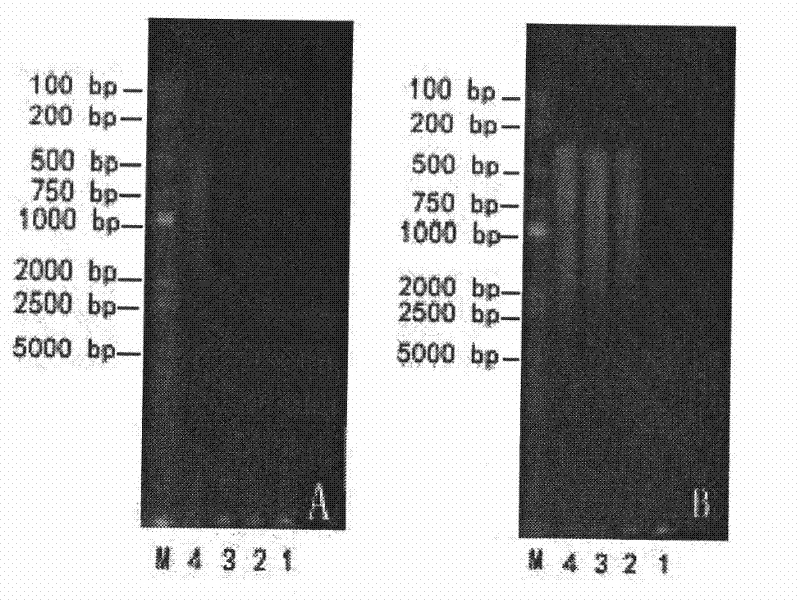Method for separating cotton chromosomes
A separation method and chromosome technology, applied in the field of molecular cytogenetics, can solve the problems of no cotton single-chromosome library establishment, no cotton chromosome micro-separation, etc., and achieve the effect of clear shape, avoid pollution, and reduce cumbersome procedures
Inactive Publication Date: 2012-08-22
INST OF COTTON RES CHINESE ACAD OF AGRI SCI
View PDF0 Cites 0 Cited by
- Summary
- Abstract
- Description
- Claims
- Application Information
AI Technical Summary
Problems solved by technology
So far, there are no reports on the microsegregation of cotton chromosomes, let alone the establishment of cotton single-chromosome libraries.
Method used
the structure of the environmentally friendly knitted fabric provided by the present invention; figure 2 Flow chart of the yarn wrapping machine for environmentally friendly knitted fabrics and storage devices; image 3 Is the parameter map of the yarn covering machine
View moreImage
Smart Image Click on the blue labels to locate them in the text.
Smart ImageViewing Examples
Examples
Experimental program
Comparison scheme
Effect test
Embodiment 1
[0042] Example 1 Cotton Chromosome No. 5 Microseparation Technique
[0043] 1 Materials and methods
[0044] 1.1 Experimental materials
the structure of the environmentally friendly knitted fabric provided by the present invention; figure 2 Flow chart of the yarn wrapping machine for environmentally friendly knitted fabrics and storage devices; image 3 Is the parameter map of the yarn covering machine
Login to View More PUM
 Login to View More
Login to View More Abstract
The invention belongs to the technical field of molecular cytogenetics and particularly relates to a method for separating cotton chromosomes, which comprises the following steps: preparing material, preprocessing the material, performing primary hypotonic treatment, performing enzymolysis, performing secondary hypotonic treatment, drying and covering a plate, removing the cover plate, performingchromosome microisolation and collecting the chromosomes. In the method of the invention, the primary hypotonic treatment, emzymolysis, secondary hypotonic treatment and plate covering method are combined to prepare for making a chromosome membrane sheet; cell walls are completely removed; the chromosomes well disperse after being compressed slightly; and the shapes of the chromosomes are so clear as to facilitate the recognition of target chromosomes.
Description
technical field [0001] The invention belongs to the field of molecular cytogenetics, and in particular relates to a cotton chromosome separation method. Background technique [0002] Molecular marker breeding is one of the important technologies for crop improvement. Establishing high-density molecular marker maps for important crops is a prerequisite for the realization of molecular markers for agronomic traits and the isolation of useful genes using positional cloning techniques. Many molecular marker linkage maps of crops that have been constructed at present start from the whole genome, and the genetic maps made by various molecular markers require a large amount of work, and it is difficult to make fine maps. For example, starting from a single chromosome or a fragment of a chromosome can be done Greatly improve work efficiency, and help to improve the fineness of genetic maps and physical maps of various crops. In 1981, the chromosome microdissection and microcloning...
Claims
the structure of the environmentally friendly knitted fabric provided by the present invention; figure 2 Flow chart of the yarn wrapping machine for environmentally friendly knitted fabrics and storage devices; image 3 Is the parameter map of the yarn covering machine
Login to View More Application Information
Patent Timeline
 Login to View More
Login to View More Patent Type & Authority Patents(China)
IPC IPC(8): C12N15/10C12P19/34
Inventor 彭仁海王坤波王春英刘方黎绍惠宋国立张香娣王玉红
Owner INST OF COTTON RES CHINESE ACAD OF AGRI SCI
Features
- R&D
- Intellectual Property
- Life Sciences
- Materials
- Tech Scout
Why Patsnap Eureka
- Unparalleled Data Quality
- Higher Quality Content
- 60% Fewer Hallucinations
Social media
Patsnap Eureka Blog
Learn More Browse by: Latest US Patents, China's latest patents, Technical Efficacy Thesaurus, Application Domain, Technology Topic, Popular Technical Reports.
© 2025 PatSnap. All rights reserved.Legal|Privacy policy|Modern Slavery Act Transparency Statement|Sitemap|About US| Contact US: help@patsnap.com



